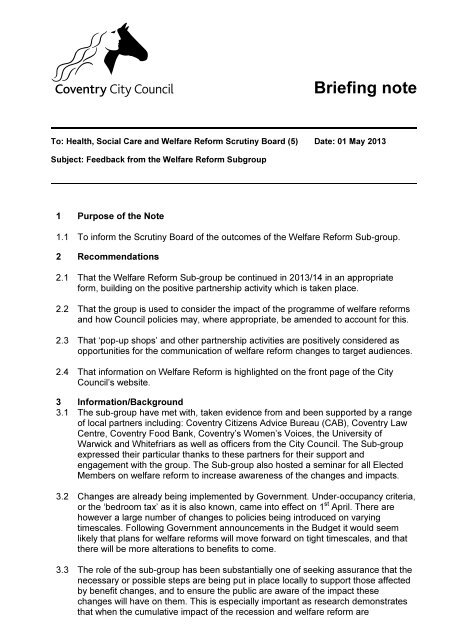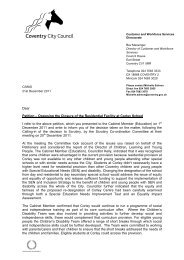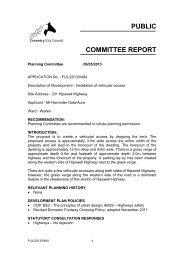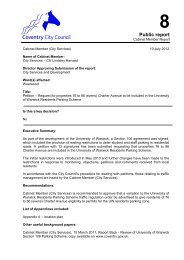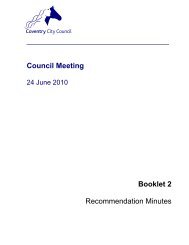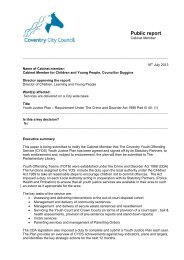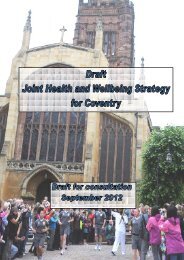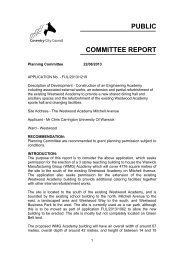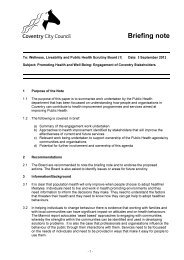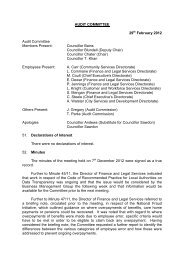Briefing note - Coventry City Council
Briefing note - Coventry City Council
Briefing note - Coventry City Council
You also want an ePaper? Increase the reach of your titles
YUMPU automatically turns print PDFs into web optimized ePapers that Google loves.
abc<br />
<strong>Briefing</strong> <strong>note</strong><br />
To: Health, Social Care and Welfare Reform Scrutiny Board (5) Date: 01 May 2013<br />
Subject: Feedback from the Welfare Reform Subgroup<br />
1 Purpose of the Note<br />
1.1 To inform the Scrutiny Board of the outcomes of the Welfare Reform Sub-group.<br />
2 Recommendations<br />
2.1 That the Welfare Reform Sub-group be continued in 2013/14 in an appropriate<br />
form, building on the positive partnership activity which is taken place.<br />
2.2 That the group is used to consider the impact of the programme of welfare reforms<br />
and how <strong>Council</strong> policies may, where appropriate, be amended to account for this.<br />
2.3 That ‘pop-up shops’ and other partnership activities are positively considered as<br />
opportunities for the communication of welfare reform changes to target audiences.<br />
2.4 That information on Welfare Reform is highlighted on the front page of the <strong>City</strong><br />
<strong>Council</strong>’s website.<br />
3 Information/Background<br />
3.1 The sub-group have met with, taken evidence from and been supported by a range<br />
of local partners including: <strong>Coventry</strong> Citizens Advice Bureau (CAB), <strong>Coventry</strong> Law<br />
Centre, <strong>Coventry</strong> Food Bank, <strong>Coventry</strong>’s Women’s Voices, the University of<br />
Warwick and Whitefriars as well as officers from the <strong>City</strong> <strong>Council</strong>. The Sub-group<br />
expressed their particular thanks to these partners for their support and<br />
engagement with the group. The Sub-group also hosted a seminar for all Elected<br />
Members on welfare reform to increase awareness of the changes and impacts.<br />
3.2 Changes are already being implemented by Government. Under-occupancy criteria,<br />
or the ‘bedroom tax’ as it is also known, came into effect on 1 st April. There are<br />
however a large number of changes to policies being introduced on varying<br />
timescales. Following Government announcements in the Budget it would seem<br />
likely that plans for welfare reforms will move forward on tight timescales, and that<br />
there will be more alterations to benefits to come.<br />
3.3 The role of the sub-group has been substantially one of seeking assurance that the<br />
necessary or possible steps are being put in place locally to support those affected<br />
by benefit changes, and to ensure the public are aware of the impact these<br />
changes will have on them. This is especially important as research demonstrates<br />
that when the cumulative impact of the recession and welfare reform are
considered, it is mainly those most disadvantaged who will be hit hardest. Further<br />
many of the welfare reforms hit particular individuals or families repeatedly,<br />
particularly those with disabilities or who are carers.<br />
3.4 The sub-group have covered a number of topics, and these are summarised below.<br />
<strong>Council</strong> Tax Benefit (now <strong>Council</strong> Tax Support)<br />
3.5 The <strong>City</strong> <strong>Council</strong> is protecting the current level of <strong>Council</strong> Tax Benefit received by<br />
residents in the <strong>City</strong>. Locally, Dudley and Solihull, for example, will be doing the<br />
same. However, this is not the case in all local authorities, as 75% (including many<br />
of the Warwickshire District and Borough <strong>Council</strong>s) will be passing on some<br />
proportion of the cuts to residents. There will be changes to the back office<br />
processes for <strong>Council</strong> staff but constituents will not notice any change. This scheme<br />
is now in place and implemented for 2013/14.<br />
‘Bedroom tax’<br />
3.6 This only affects working age people in social housing. Pensioners are exempt and<br />
they will not face any reductions in benefit in relation to the number of bedrooms in<br />
their properties.<br />
3.7 Across <strong>Coventry</strong> as a whole, there are 2556 customers who will lose £12.92 per<br />
week and 624 people who will lose £22.61 from the benefits. Whitefriars, who have<br />
taken part in many of the Sub-groups meetings have written to, and visited, all of<br />
their 2400 tenants who are affected.<br />
3.8 Following a concerted campaign by groups supporting children in care the<br />
Government has recently changed policy;<br />
3.8.1 Approved foster carers will be allowed a maximum of one additional room<br />
(irrespective of the number of foster children), whether or not a child has been<br />
placed with them or they are between placements. To qualify for this they must<br />
have fostered a child, or become an approved foster carer in the last 12 months.<br />
3.8.2 Adults who are in the armed forces but who continue to live with parents will be<br />
treated as continuing to live at home, even when deployed on operations. This<br />
means that the size criteria rules will not be applied to the room normally occupied<br />
by the member of the armed forces if they intend to return home.<br />
3.8.3 Where a room is required for a non resident carer an additional room will be used in<br />
the assessment of Housing Benefit. Details should be provided to the Benefits<br />
Service in order for this to be considered.<br />
3.8.4 An additional room will also be allowed for children who are unable to share<br />
because of their severe disabilities. Medical evidence of the disability will be<br />
required by the Benefits Service, as will evidence that the nature and frequency of<br />
care required during the night would be significantly disruptive to the sleep of the<br />
child who would normally be required to share the bedroom.<br />
3.9 Only pensioners, shared owners and those in supported (exempt) accommodation<br />
are exempt. In all other in all other situations will be looked at on a case by case<br />
basis and, e.g. may have 2 spare bedrooms and have a circumstance that allows<br />
them to have 1 spare bedroom but not 2. This means that their housing benefit will<br />
still be reduced by the amount for 1 spare bedroom (14%).<br />
3.10 There are a number of scenarios in which people will be considered as under–<br />
occupying. For example, if a couple need to sleep in separate bedrooms for<br />
medical reasons, perhaps the use of an oxygen machine or to enable the carer<br />
respite, these circumstances are not accounted for when looking at under<br />
2
occupancy criteria. Another scenario is where a property has been adapted for use,<br />
but there is a spare bedroom(s) – these residents will be considered as underoccupying.<br />
3.11 Provided that the property is not under-occupied, there is no limit on the number of<br />
bedrooms that are allowed. This means that larger families are not penalised.<br />
3.12 If a family member is temporarily absent from home her/his absence can be ignored<br />
under housing benefit rules for up to 13 weeks if s/he is absent for any reason, or<br />
for up to 52 weeks if s/he is absent for a prescribed reason, for example, because<br />
s/he is in hospital or is a student studying away from home. In all cases s/he must<br />
intend to return home after her/his period of absence.<br />
3.13 There is a bedroom calculator for social housing tenants on the Adviceguide<br />
website at www.adviceguide.org.uk.<br />
Discretionary Housing Payment Fund<br />
3.14 This fund allows the <strong>Council</strong> the discretion to help people on a low income with their<br />
housing costs where Housing Benefit (HB) alone does not meet all of their needs.<br />
<strong>Council</strong>s have been given some additional money from the Government to support<br />
the welfare reform changes.<br />
3.15 <strong>Coventry</strong> has a fund of £800,000 for 2013/14. However, we estimate that at least £9<br />
million has been cut (from <strong>Coventry</strong> residents) since the first changes took place in<br />
April 2011.<br />
3.16 There will not be sufficient funding to help all of those who apply to for a payment.<br />
Officers will therefore be undertaking assessments of applicants’ income and<br />
expenditure. They will carefully consider the circumstances of each case before<br />
deciding whether to make an award.<br />
3.17 If a customer is not happy with the outcome of their application, then a senior officer<br />
will look at the application. There are no formal appeal rights.<br />
3.18 During 2013/14, the group may wish to monitor demand for the fund.<br />
Homefinder<br />
3.19 The Transport and Infrastructure Development Scrutiny Board (6) have undertaken<br />
a task and finish group to look at Homefinder, and allocations of social housing.<br />
This choice-based lettings scheme has been amended to increase the priority of<br />
applications or bids of people who wish to downsize, to try and facilitate movement<br />
in the social housing market and free up properties to help those affected by under<br />
occupancy.<br />
3.20 Housing associations have been looking to see what support they can offer those<br />
who wish to downsize and the <strong>Council</strong> has experimented with different schemes<br />
and incentives to support this.<br />
Benefit Cap<br />
3.21 The Benefit Cap is being phased-in by DWP from April 2013 – starting with four<br />
London Boroughs. It will be rolled-out nationally between 15 th July and 30 th<br />
September. The Cap places a limit on the weekly total amount of benefit a<br />
3
household can receive - £500 for couples and single parent families and £350 for<br />
single people.<br />
3.22 The benefit cap will not apply if anyone in the household (excluding nondependents)<br />
receives:<br />
• Working Tax Credit (the government have said this will also apply to those who<br />
work sufficient hours to qualify for WTC even if they do not receive it)<br />
• Disability Living Allowance (or the Personal Independence Payment from April<br />
2013)<br />
• Attendance Allowance<br />
• the support component of Employment and Support Allowance<br />
• War Pensions (including War Widows or War Widower's Pension)<br />
• Industrial Injuries Benefit.<br />
3.23 If the benefit goes over the cap, it will be the housing benefit that is cut. DWP are<br />
writing to those affected. Anecdotal discussions suggest people are saying they will<br />
take the financial hit.<br />
3.24 There are about 270 families in <strong>Coventry</strong> who will be impacted by the benefit cap.<br />
About 170 cases are in private sector housing and the balance of around 100<br />
families with Registered Social Landlords. . The weekly loss of benefit ranges from<br />
under £10 to over £150 per week. The total annual loss is estimated to be over<br />
£820,000.<br />
3.25 DWP have been writing to affected people since March and will be double checking<br />
which individuals/families are impacted between now and July.<br />
3.26 The <strong>Council</strong> is working with partners on the best approach to supporting people<br />
affected by this change. In the majority of cases, the most relevant support is likely<br />
to be budgeting advice. The DHP fund is also likely to be considered for some<br />
cases.<br />
Changes to benefits for the disabled<br />
3.27 There have been a series of road shows across the city for disabled people to<br />
highlight the impact of the changes. Retesting on eligibility of disability allowances<br />
(ESA and DLA) is going on until 2017.<br />
3.28 With regards to ESA, about a third of people are failing their applications based on<br />
their medical examination. Appeals are currently at an 85% success rate in<br />
<strong>Coventry</strong>, although it can take up to 10 months for the appeal to take place. New<br />
appeals venues in Leamington and Nuneaton to hear appeals should help to<br />
reduce the wait. The Law Centre are trying to support people with how to fill in<br />
forms and score points during their initial application so that they avoid the need to<br />
go the appeal, and are aiming to train volunteers to do offer this support.<br />
3.29 Personal Independence Payment (PIP) is a benefit for people aged 16 to 64 with a<br />
long-term health condition or disability. From 8 April 2013, it replaces Disability<br />
Living Allowance (DLA) for some people making a new claim. From 10 June 2013,<br />
it replaces DLA for all new claims. There are 18,385 people in <strong>Coventry</strong> on DLA<br />
and the Government's aim is to reduce this amount by 20% (500,000 people<br />
nationally) when people move onto PIP.<br />
3.30 People already getting DLA, PIP is being introduced gradually over several years<br />
and will eventually replace DLA. The Department for Work and Pensions (DWP) will<br />
4
write to poeple at some point between 7 October 2013 and September 2017 asking<br />
them to make a new claim for PIP instead of DLA. People don't have to do anything<br />
until they are contacted.<br />
3.31 Most people getting DLA won't be affected before October 2015.<br />
3.32 DLA will be replaced by Personal Independence Payments (PIP). Changes will<br />
begin from June on a phased basis.<br />
3.33 It is possible that people will be reassessed for both benefits.<br />
3.34 The Roadshows run by the Law Centre have so far been attended by 227 people<br />
and 74% have requested further help. A bid for additional resources to meet the<br />
needs identified in these events has been submitted to the Reaching Communities<br />
Lottery fund.<br />
Crisis Loans and Community Care Grants (now Community Support Grants)<br />
3.35 Crisis loans and community care grants have been abolished. From April 2013,<br />
each local authority has been responsible for implementing its own scheme. In<br />
<strong>Coventry</strong>, it is the Community Support Grant Scheme.<br />
3.36 The main aim of the scheme will be to support vulnerable people, experiencing<br />
financial difficulties. The support will be given for food, goods or services in a crisis<br />
situation or where there is exceptional financial pressure on an individual or<br />
families.<br />
3.37 Each case will be treated strictly on its merits and all customers will receive equal<br />
and fair treatment within a transparent process taking full account of the <strong>Council</strong>’s<br />
responsibilities under all relevant government legislation, for example the Human<br />
Rights Act and Equality Act 2010.<br />
3.38 The scheme provides people with pre-paid cards (Tesco’s for food and toiletries,<br />
Argos for household items), and the use of the ‘paypoint’ system (for gas and<br />
electricity top-ups) to be given instead of cash.<br />
3.39 The sub-group may wish to consider monitoring use of the fund during 2013/14.<br />
Communications<br />
3.40 When the group first met in November, there was concern that there was<br />
insufficient communication of the changes taking place. However, there is now an<br />
officer communication group which involves a number of our partners. The Chair of<br />
SB5 is consulted on council press releases and quoted as the Lead Member on<br />
Welfare Reform.<br />
3.41 There have been articles in Citivision, however, the Sub-group would still like to see<br />
the changes have a higher profile on the front page <strong>Council</strong>’s website, for example,<br />
as Nuneaton and Bedworth Borough <strong>Council</strong> have done.<br />
<strong>Coventry</strong> Partnership<br />
3.42 There has been good evidence of partnership working in the <strong>City</strong>. <strong>Council</strong> Officers,<br />
Housing Associations and Advice Agencies are meeting monthly to coordinate their<br />
work and ensure good communications. These meetings are held at Whitefriars<br />
with support provided by the <strong>City</strong> <strong>Council</strong>.<br />
5
Social Care<br />
3.43 The main potential impact of benefit changes on Social Care services relates to<br />
people with disabilities and the impact of them having significantly reduced<br />
incomes. This could have a knock on effect on those able to contribute financially to<br />
the care services they receive which could lead to reduced revenues and potentially<br />
more service users unable to make a contribution.<br />
3.44 This is unlikely to have major implications until 2017 as current DLA users will not<br />
be reviewed until then. The impacts are being considered alongside A Bolder<br />
Community Services programme.<br />
Children’s Services<br />
3.45 The Common Assessment Framework (CAF) process already allows Children’s<br />
Social Care to pick up families who may be running into difficulties associated with<br />
child poverty. Services do not, however, intervene just because families are poor.<br />
Managers are aware that there might be an increase in referrals due to the stresses<br />
reduced finances can place on families.<br />
3.46 Concerns have been raised about the movement of children and families across the<br />
<strong>City</strong> as a result of changing housing need. This could cause a possible disruption to<br />
schooling, and create additional pressure for places at some schools. The message<br />
from officers in Children’s Services was clear – where possible, if families have a<br />
choice, to prioritise moving to a property where children can remain in the same<br />
school as the outcomes will be better for the young person. School moves,<br />
particularly mid-year have a detrimental impact on a child’s education and should<br />
be avoided if possible. This is reflected in the DHP Policy and assessment process.<br />
3.47 There is also pressure already on school places in some areas of the <strong>City</strong>, and<br />
there is no guarantee that those who seek to move will be able to get their children<br />
into the nearest school to their new homes. Schools admission criteria are fixed and<br />
subject to nationally set rules; they are not able to be amended in response to the<br />
current set of reforms.<br />
3.48 <strong>Coventry</strong> <strong>City</strong> <strong>Council</strong> Benefits and Whitefriars are now sharing data with CLYP to<br />
give an indication of the likely location of families who will be most affected by the<br />
changes and compare where there are empty properties and available school<br />
places.<br />
3.49 Benefits and CLYP already share data to inform the Troubled Families programme<br />
and are looking at likely benefit changes to individual families already supported.<br />
3.50 CAB are running a schools project in 31 of the <strong>City</strong>’s schools and are expanding<br />
into Children’s Centres from April. Early results suggest this has been particularly<br />
effective in getting parents to access support and prevent debt and housing<br />
problems escalating create significant problems.<br />
Universal Credit<br />
3.51 The Government has decided to phase-in the introduction of the Universal Credit<br />
‘pathfinders’. One Job Centre is due to start taking very straightforward claims from<br />
29 th April 2013. A further three sites are due to be ‘rolled-out’ as ‘pathfinders’ but<br />
the actual dates have not been announced. DWP have delayed the announcement<br />
of the programme of migration of existing claims from the legacy benefits (such as<br />
housing benefit). Originally, the intention was for a ‘managed transition’ for existing<br />
claims between April 2014 and October 2017.<br />
6
3.52 DWP have recently consulted on a proposed ‘Local Support Services Framework’,<br />
covering the type of support that DWP would be willing to fund, how current<br />
partnerships work,and how a partnership approach might work in the future. The<br />
outcome of this will ultimately determine the extent of the involvement of councils in<br />
the delivery of Universal Credit.<br />
‘Pop up shop’<br />
3.53 Members visited the ‘pop up shop’ in Cathedral Lanes during their March meeting.<br />
The shop was open from 18 – 22 March and a range of partners (Law Centre, CAB,<br />
Midland Heart, Whitefriars) provide advice and guidance to people who dropped in<br />
to find out more about the changes. This project is currently being evaluated, but<br />
initial assessments from the participants suggest that there were around 100<br />
members of the public accessing advice each day.<br />
3.54 The Sub-group have recommended that ‘pop up shops’ and other innovative<br />
methods of connecting with key groups in the <strong>City</strong> are considered at key points over<br />
the coming period. It was also suggested that alternative locations are considered<br />
for the shops across the city.<br />
Advice Services Review<br />
3.55 The Sub-Group held a meeting on the advice services review and formulated a<br />
consultation response. This response will be considered as part of the review and<br />
the outcome of the consultation will be shared with Members.<br />
<strong>Coventry</strong> Food bank<br />
3.56 The Sub-group were keen to consider the wider impacts of both the recession and<br />
proposed welfare reforms. The <strong>Coventry</strong> Food Bank attended one of the meetings<br />
to describe their work and the steady rise in <strong>Coventry</strong> residents accessing<br />
emergency support from them. They reported a significant year on year increase in<br />
the demand for their service. Whilst based in Hillfields, the Food Bank has locations<br />
across the <strong>City</strong> and are responding to a growing number of referrals by<br />
professionals for families to have their immediate food needs met by donations.<br />
3.57 <strong>Coventry</strong> CAB have seen a substantial increase in the number of clients requiring<br />
food bank vouchers as a result of a benefit sanction, they are currently carrying out<br />
reseach into the main drivers behind food bank demand, this should be available by<br />
early Summer 2013.<br />
Equality Impact Assessments and Human Rights<br />
3.58 Members received a presentation which set out the probable equality impacts of<br />
welfare reform. This is an on-going piece of work and the impacts of the recession<br />
and welfare reform will continue to be monitored across directorates and<br />
partnership organisations.<br />
a. There is likely to be a £30 million cost to women and a £12 million cost to<br />
men.<br />
b. The cost to women to be higher as more likely to be reliant on benefits –<br />
those most likely to be effected, as they are also being hit by other cuts to<br />
services as well as benefit changes are<br />
i. Loan parents<br />
ii. Single pensioners<br />
c. Poverty is a cause of ill health and there is already a huge gap in life<br />
expectancy in the city.<br />
7
d. Cuts are happening to social care as well which impacts not only on the<br />
client but on the family who have to fill in the gaps in support.<br />
e. The voluntary sector in <strong>Coventry</strong> is struggling to meet the demand for their<br />
services.<br />
2) The impact on women due to changes in the way benefits will be paid to one<br />
individual who will be considered the ‘head of the household’<br />
a. It matters who receives the income in the family as money given to women<br />
is more likely to be spent on children – women are the 'shock absorbers of<br />
poverty'<br />
b. There is the opportunity for an increase in financial abuse<br />
c. Universal credit will disadvantage second earners as incomes will be a lot<br />
lower then under tax credits.<br />
d. In <strong>Coventry</strong> there is already a lower number of women working or looking<br />
for work then nationally – therefore, there are issues when relationships<br />
breakdown.<br />
3.59 The <strong>City</strong> <strong>Council</strong> have a wide ranging equality impact assessment process which is<br />
used during decision making and each approved policy will have an Equality and<br />
Consultation Analysis.<br />
3.60 Impacts on <strong>Coventry</strong> <strong>City</strong> <strong>Council</strong><br />
3.61 Staff in benefits and housing have been moved into appropriate roles and trained to<br />
deal with the likely impacts of the changes. Looking to ensure staff have<br />
appropriate training in dealing with people with mental health issues.<br />
3.62 Closer working links have been developed by Benefits, Housing and Children’s<br />
Social Care, to ensure people are only accessing one source of support from the<br />
<strong>Council</strong>. This should also remove the situation which has arisen in the past, where<br />
when someone has been turned away by housing, they have gone to social<br />
services and demanded to be housed.<br />
3.63 Welfare Reform is on the corporate risk register and Audit Committee are<br />
monitoring developments. If Members wish to view the risk register, please contact<br />
the Internal Audit team.<br />
3.64 Further possible work for 2013/14<br />
Credit Unions<br />
3.65 Credit Unions have a role to play in providing financial facilities for those who do<br />
not have access to bank accounts. The board may wish to look at how credit unions<br />
are supporting residents to budget and access their funds and at the pilot<br />
Whitefriars are operating with New Central Credit Union. This is to provide “jam jar”<br />
accounts for those who cannot access mainstream bank accounts.<br />
DWP<br />
3.65 There has been a substantial rise in the number of sanctions being used for those<br />
on Job Seekers Allowance.<br />
3.66 Partners raised concerns about how sanctions are being used and the impact on<br />
residents. It was raised that these sanctions may disproportionately impact on those<br />
with mental health issues as they appear ‘fit for work’.<br />
3.67 Members may wish to consider looking at how the remaining elements of the Social<br />
Fund are working e.g. Short Term Benefit Advances and Budgeting Advances.<br />
Clients and Partners are confused about what the <strong>Council</strong> offers and what the DWP<br />
8
offers, particularly around interim funding whilst someone is awaiting the first<br />
payment of their benefits.<br />
Community Cohesion<br />
3.68 Questions have been asked about the possible impacts of welfare reform on<br />
community cohesion, particularly around those who are forced to move and<br />
isolation. However, this is not an area that the sub-group were able to explore in the<br />
time frame in 2012/13 and may be something that they wish to pick up in the next<br />
municipal year.<br />
Summary<br />
3.69 This has been a positive year for the sub-group. The sub-group has covered a lot of<br />
ground over a short period of time. However, there is still work to do as further<br />
changes are introduced and the impact is felt by the <strong>City</strong>’s residents.<br />
Peter Barnett/ Victoria Castree<br />
Scrutiny Team<br />
204 7683 1172/1122<br />
9


